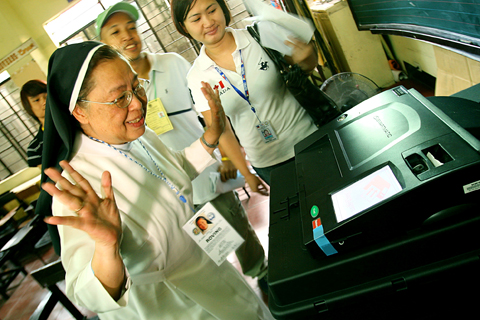Problems with ballot machines yesterday kept some Filipino voters waiting for hours, including the presidential frontrunner, and may have lowered turnout, but there was no sign of widespread failure that would derail the elections.
Officials had expected turnout as high as 85 percent, but analysts and election monitors said the actual figure could be much lower as many had given up and gone home without voting.
With widespread technical failure and serious violence not materializing, the main risks now would be a very low turnout figure, or problems with the transmission and collation of results, expected to start yesterday evening.

PHOTO: EPA
“Many of the problems experienced thus far were expected, but major voter frustration and disenfranchisement could result in lower than expected turnout, and compromise election results,” consultancy Pacific Strategies & Assessments said.
Challenges and unrest are also a risk if the clear frontrunner in opinion polls, Senator Benigno “Noynoy” Aquino, does not win the race to succeed Philippine President Gloria Macapagal Arroyo.
Opinion polls suggest Aquino will be the next president. He had a 20-point lead over former president Joseph Estrada and Senator Manny Villar, with Gilberto Teodoro, candidate of the outgoing administration, a distant fourth.
In a country where some degree of violence and chaos is regarded as normal during elections, most voters took technical hitches in their stride and waited patiently for their turn.
“I prayed for a peaceful election, so our country can move forward. People are sick and tired of the cheating and fraud in the past elections,” 57-year-old voter Danilo Arriola said.
The use of a new and untested automated voting system posed a major risk for the election and concerns rose following the recall of more than 76,000 memory chips after a fault was found.
While the glitches caused the election commission to extend voting by an hour to 7pm, they did not appear widespread or serious enough to fatally undermine the polls. Even after 7pm, voters who had been within 30m of a polling station were allowed to vote.
The military reported 37 incidents of election day violence, with at least nine dead and 12 wounded, including a gunfight in Maguindanao, where 57 people died in an election-related massacre in November last year.

The CIA has a message for Chinese government officials worried about their place in Chinese President Xi Jinping’s (習近平) government: Come work with us. The agency released two Mandarin-language videos on social media on Thursday inviting disgruntled officials to contact the CIA. The recruitment videos posted on YouTube and X racked up more than 5 million views combined in their first day. The outreach comes as CIA Director John Ratcliffe has vowed to boost the agency’s use of intelligence from human sources and its focus on China, which has recently targeted US officials with its own espionage operations. The videos are “aimed at

STEADFAST FRIEND: The bills encourage increased Taiwan-US engagement and address China’s distortion of UN Resolution 2758 to isolate Taiwan internationally The Presidential Office yesterday thanked the US House of Representatives for unanimously passing two Taiwan-related bills highlighting its solid support for Taiwan’s democracy and global participation, and for deepening bilateral relations. One of the bills, the Taiwan Assurance Implementation Act, requires the US Department of State to periodically review its guidelines for engagement with Taiwan, and report to the US Congress on the guidelines and plans to lift self-imposed limitations on US-Taiwan engagement. The other bill is the Taiwan International Solidarity Act, which clarifies that UN Resolution 2758 does not address the issue of the representation of Taiwan or its people in

US Indo-Pacific Commander Admiral Samuel Paparo on Friday expressed concern over the rate at which China is diversifying its military exercises, the Financial Times (FT) reported on Saturday. “The rates of change on the depth and breadth of their exercises is the one non-linear effect that I’ve seen in the last year that wakes me up at night or keeps me up at night,” Paparo was quoted by FT as saying while attending the annual Sedona Forum at the McCain Institute in Arizona. Paparo also expressed concern over the speed with which China was expanding its military. While the US

SHIFT: Taiwan’s better-than-expected first-quarter GDP and signs of weakness in the US have driven global capital back to emerging markets, the central bank head said The central bank yesterday blamed market speculation for the steep rise in the local currency, and urged exporters and financial institutions to stay calm and stop panic sell-offs to avoid hurting their own profitability. The nation’s top monetary policymaker said that it would step in, if necessary, to maintain order and stability in the foreign exchange market. The remarks came as the NT dollar yesterday closed up NT$0.919 to NT$30.145 against the US dollar in Taipei trading, after rising as high as NT$29.59 in intraday trading. The local currency has surged 5.85 percent against the greenback over the past two sessions, central